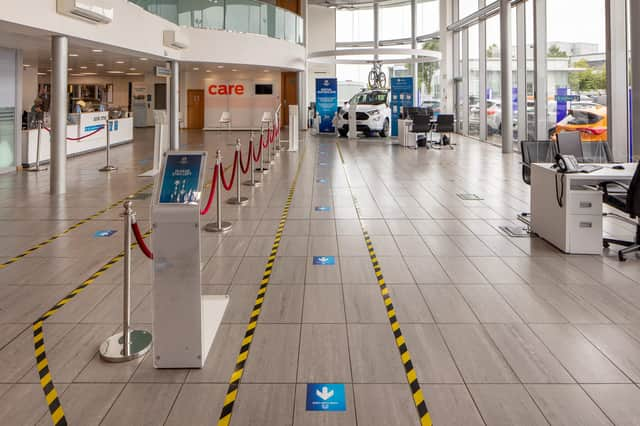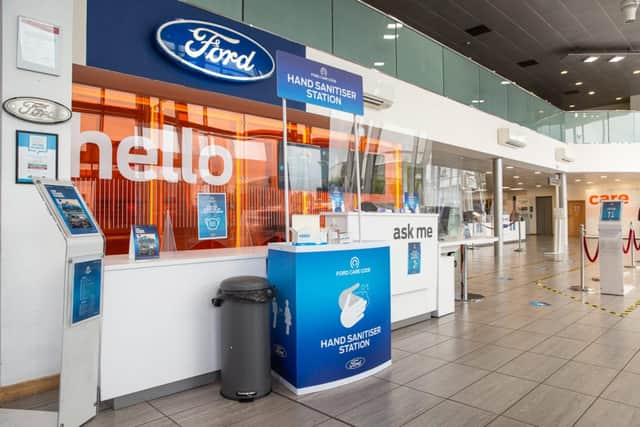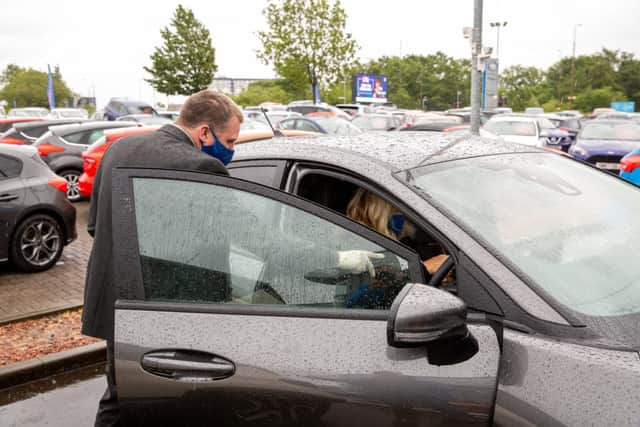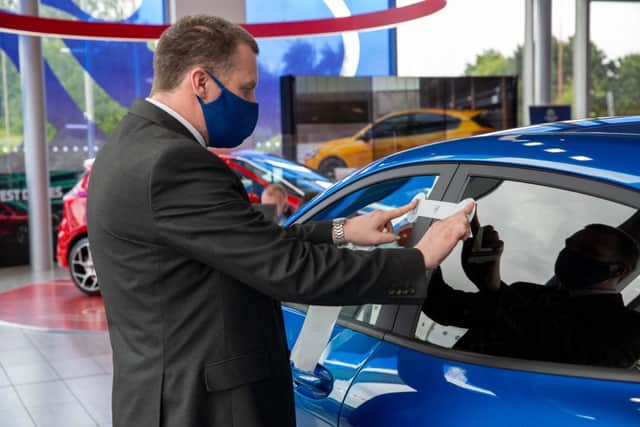Face masks and one-way systems the new normal as Scottish car showrooms reopen


From June 29, car showrooms across Scotland have been allowed to reopen to the public, ending three months of uncertainty in the industry.
The automotive sector essentially shut down at the end of March, with all showrooms ordered to close. As a result, new car registrations in the UK dropped to their lowest levels since 1946, so dealers have been desperate to reopen and get back to work.
Advertisement
Hide AdAdvertisement
Hide AdBut like every walk of life, things have had to change for dealerships, with social distancing and infection-control at the forefront of everyone’s minds.
To see what the changes mean for customers I went along to Peoples Ford in Edinburgh to see how dealers have adapted.
Controlled environment
It is at once a very different yet strangely familiar experience.
Where once customers turned up whenever they liked and wandered freely among cars, opening and closing doors, poking and prodding buttons, things are much more controlled in this post-lockdown world.
Advertisement
Hide AdAdvertisement
Hide AdCustomers are encouraged to make an appointment in order to limit the number of people on-site, and as soon as you step into the showroom you’re greeted by a station with hand sanitiser and face masks. The floor is marked out clearly with tape and stickers indicating a one-way system and the mandatory two-metre gap. Brochures and tea and coffee facilities are a thing of the past and signs remind you to keep a distance to other people.
Depending on why you’re there you will be guided down one of the one-way routes to the sales or service area where staff in protective face masks are waiting.


It's a different experience to the usual free-flowing nature of car showrooms but, at the same time, it feels very similar to visiting any other shop since lockdown began.
“It is different,” says Nicola Gilda, operations director for Peoples, “but it isn’t totally unfamiliar. If you go to the supermarket things are done in the same way, so it’s not completely new to people. It’s part of the new normal.”
All about safety
Advertisement
Hide AdAdvertisement
Hide Ad“Our main priority has to be the safety of our customers and staff,” adds aftersales director Ken Clezy. “We want people to feel comfortable and confident to come in knowing that we’re doing everything to keep them and us safe.”


That means daily temperature checks for all staff as soon as they arrive, protective screens and cleaning wipes on all the desks and careful protocols for everything from vehicle handovers to letting customers explore the cars on display.
Where once cars were unlocked and open for customers to climb in and out of, now vehicles are locked and sealed. But, as Ken explains, if you want to spend an afternoon comparing models on the showroom floor you still can. And if you want to take a test drive you’ll do it unaccompanied in a car that has been carefully cleaned inside and out.
“People can still get in and out of as many cars as they like, they can still do everything they did before, it’s just that we now have a process to ensure that each car is then cleaned and safe for the next customer.”
Advertisement
Hide AdAdvertisement
Hide AdNicola is keen to emphasise that despite the new signs and protocols, the focus remains on the buying experience. “Buying a car is exciting. It’s a lifestyle choice and even with all the measures in place to protect people we haven’t lost sight of that.”


Getting to this stage wasn’t easy, though, with weeks of careful planning needed to make sure all Peoples’ sites follow the government guidelines.
Nicola says: “In May we stood in an empty showroom thinking ‘what’s this going to look like when we reopen?’. Then we had to think about how it would work at each of our six locations, which are all different shapes, sizes and layouts. There’s no one-size-fits all approach so staff from across all our departments and sites have been involved in making sure that we follow all the guidelines and keep everyone safe.
“Now it’s in place, though, it’s a process that everyone understands and follows. Our staff are in control and customers won’t be daunted by it all.”
Digital future
Advertisement
Hide AdAdvertisement
Hide AdWhile the screens, handwash and one-way systems are hopefully short-term measures, Nicola predicts other effects of the lockdown will be far longer lasting as more customers do their car buying online.
As soon as lockdown began, manufacturers and dealers began exploring ways of staying in touch and dealing with customer queries. Video calling has become a go-to solution for many businesses and car dealers are no different, offering consultations and even vehicle walkrounds via video calls. And end-to-end digital transactions where customers can do everything from configuring their car to arranging finance and delivery have been rapidly rolled out.
“We’ve learned a lot from this in terms of digital,” says Nicola. “We had only just started introducing our digital showroom before this but now it’s fully operational and I think there will be a lot more digital shopping.
“It will become one of the new norms. People looking online want their experience to be interactive and we can do video walkrounds of the cars, explore the features and have live chats with customers while they’re sitting in the comfort of their own homes.
Advertisement
Hide AdAdvertisement
Hide Ad“Of course, we’ll still have people who prefer the full showroom experience and want to deal face-to-face and we’ll always have that presence and facility but I think digital routes will become as normal as traditional showrooms.”